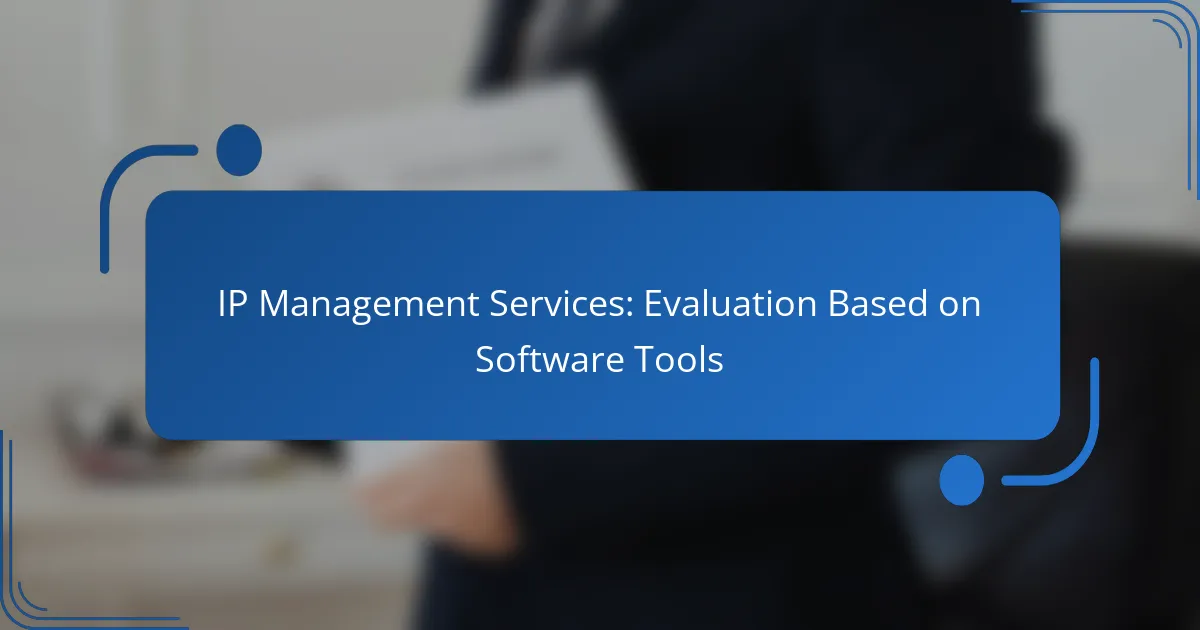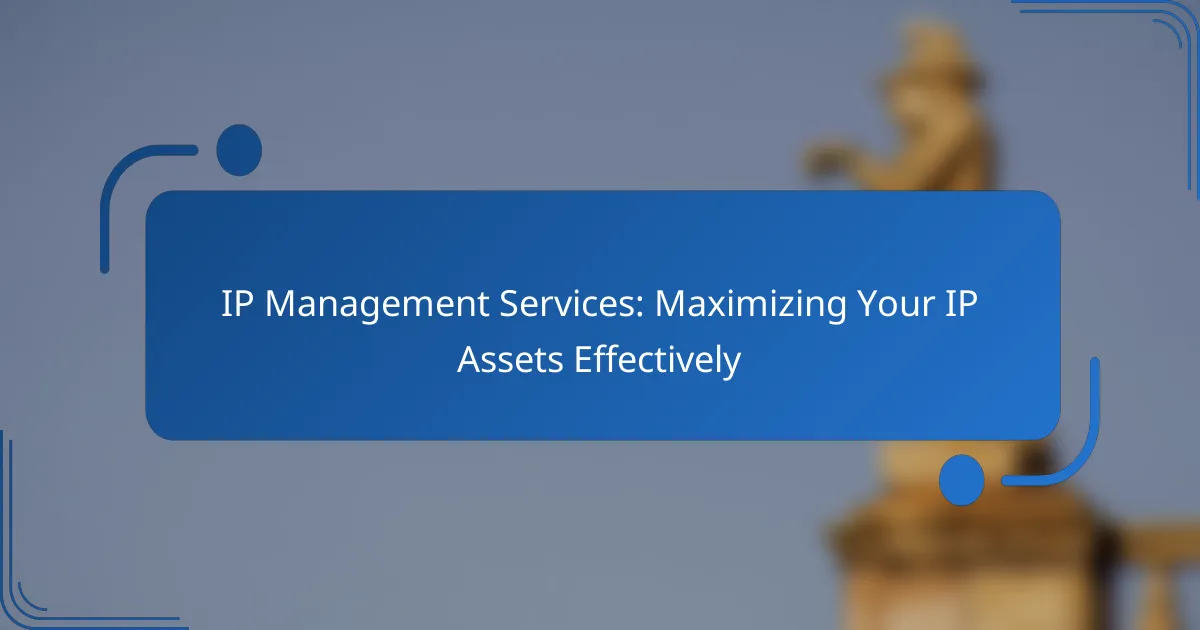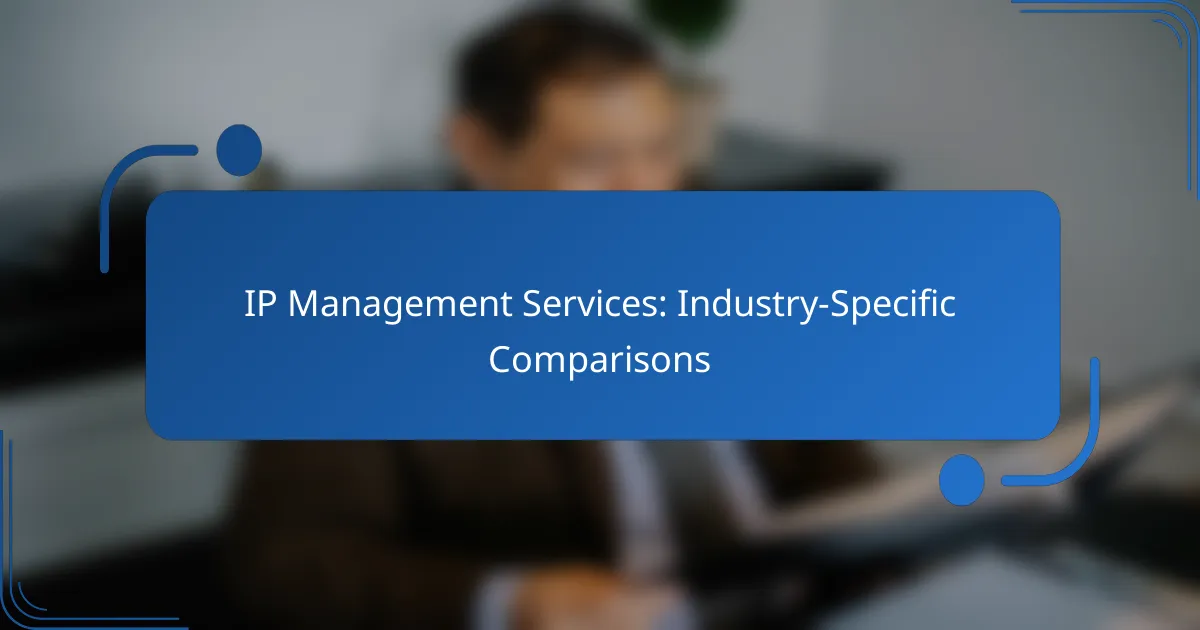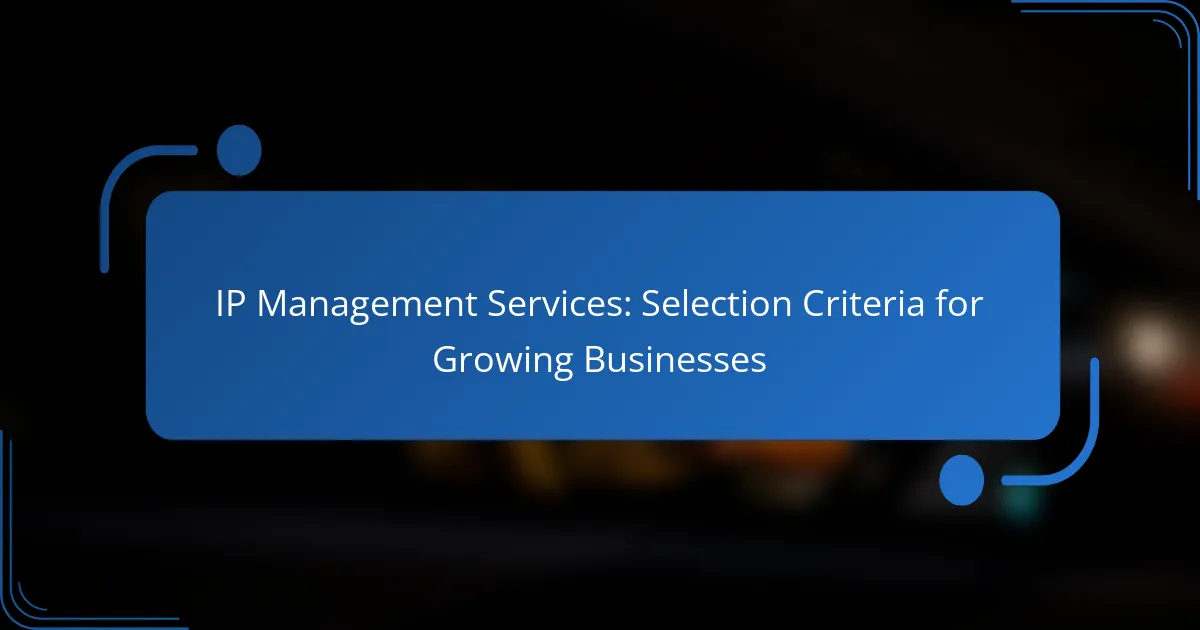IP management services play a crucial role in efficiently tracking and managing IP addresses within networks, enhancing both security and compliance. Evaluating these services involves considering factors such as cost-effectiveness, features, user experience, and integration capabilities to identify the best software tools for your organization’s needs.

What Are the Key IP Management Software Tools?
Key IP management software tools streamline the process of tracking and managing IP addresses within a network. They help organizations optimize their IP resources, enhance security, and ensure compliance with industry standards.
SolarWinds IP Address Manager
SolarWinds IP Address Manager is a comprehensive tool designed for managing IP addresses and DHCP/DNS services. It provides features like IP address tracking, subnet management, and automatic IP address conflict detection, making it suitable for both small and large networks.
This tool is particularly beneficial for IT teams looking for a user-friendly interface and robust reporting capabilities. It integrates seamlessly with other SolarWinds products, allowing for centralized network management.
ManageEngine OpUtils
ManageEngine OpUtils offers a suite of tools for IP address management, including IP address tracking and subnet management. It features real-time monitoring of IP address usage and provides alerts for conflicts, which helps maintain network integrity.
This software is ideal for organizations that require detailed analytics and reporting. Its ability to visualize IP address usage trends can assist in making informed decisions about network expansion or optimization.
Infoblox DDI
Infoblox DDI combines DNS, DHCP, and IP address management into a single solution. This integration enhances network reliability and simplifies management tasks, making it suitable for enterprises with complex network infrastructures.
Infoblox is known for its strong security features, including DNS threat protection and automated compliance reporting. Organizations can benefit from its scalability, which accommodates growth without compromising performance.
BlueCat Networks
BlueCat Networks provides a dynamic IP address management solution that integrates DNS and DHCP services. Its platform is designed to automate IP address allocation and management, reducing the risk of human error.
This tool is particularly useful for organizations looking to improve operational efficiency. BlueCat’s analytics capabilities allow users to gain insights into IP address usage patterns, which can inform future network planning.
NetBrain
NetBrain focuses on network automation and visibility, offering IP address management as part of its broader network management capabilities. It enables users to visualize their network topology and manage IP addresses effectively within that context.
This tool is advantageous for organizations that prioritize automation and real-time network monitoring. Its ability to integrate with various network devices enhances overall management efficiency and reduces downtime risks.
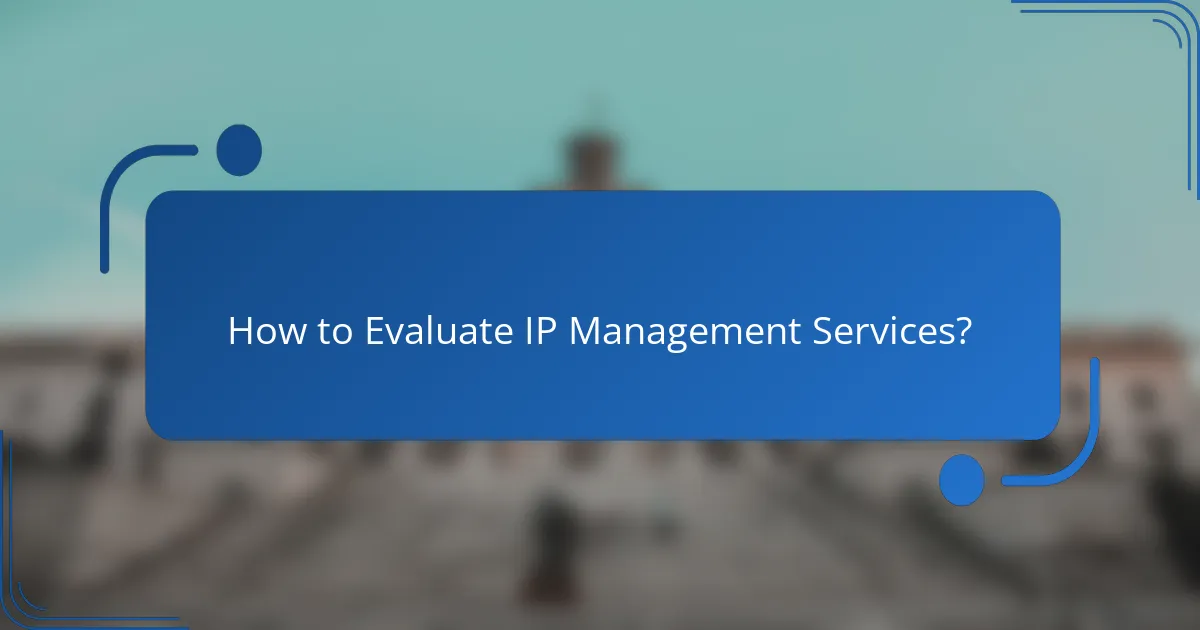
How to Evaluate IP Management Services?
Evaluating IP management services involves assessing their cost-effectiveness, feature set, user experience, and integration capabilities. These factors help determine which software tools best meet your organization’s intellectual property needs.
Cost-effectiveness
Cost-effectiveness is a critical factor when evaluating IP management services. Consider both the upfront costs and ongoing expenses, such as subscription fees or maintenance charges. Aim for solutions that offer a balance between features and affordability, typically ranging from a few hundred to several thousand dollars annually, depending on the complexity of your IP portfolio.
To ensure you get value for your investment, compare the pricing structures of different providers. Look for transparent pricing models that outline what is included in each tier, and be cautious of hidden fees that could inflate your total costs.
Feature set
The feature set of an IP management service is essential for supporting your specific needs. Key features to look for include patent and trademark tracking, document management, and reporting capabilities. Some tools may also offer advanced analytics or compliance tracking, which can enhance your IP strategy.
Evaluate whether the features align with your operational requirements. For instance, if your organization frequently files patents, ensure the software supports efficient filing processes and integrates with patent offices. A comprehensive feature set can significantly streamline your IP management efforts.
User experience
User experience plays a vital role in the effectiveness of an IP management service. A user-friendly interface can reduce the learning curve and improve productivity. Look for software that offers intuitive navigation, clear workflows, and responsive customer support.
Consider conducting trials or demos to assess the user experience firsthand. Gather feedback from your team to identify any usability issues that could hinder adoption. A positive user experience can lead to better engagement and more effective IP management.
Integration capabilities
Integration capabilities are crucial for ensuring that your IP management service works seamlessly with other tools and systems. Check if the software can integrate with existing platforms such as CRM, accounting, or legal management systems. This connectivity can enhance data sharing and streamline workflows.
When evaluating integration options, prioritize services that offer APIs or pre-built connectors. This flexibility allows for easier customization and can help future-proof your investment as your technology landscape evolves. A well-integrated system can save time and reduce errors in managing your intellectual property.
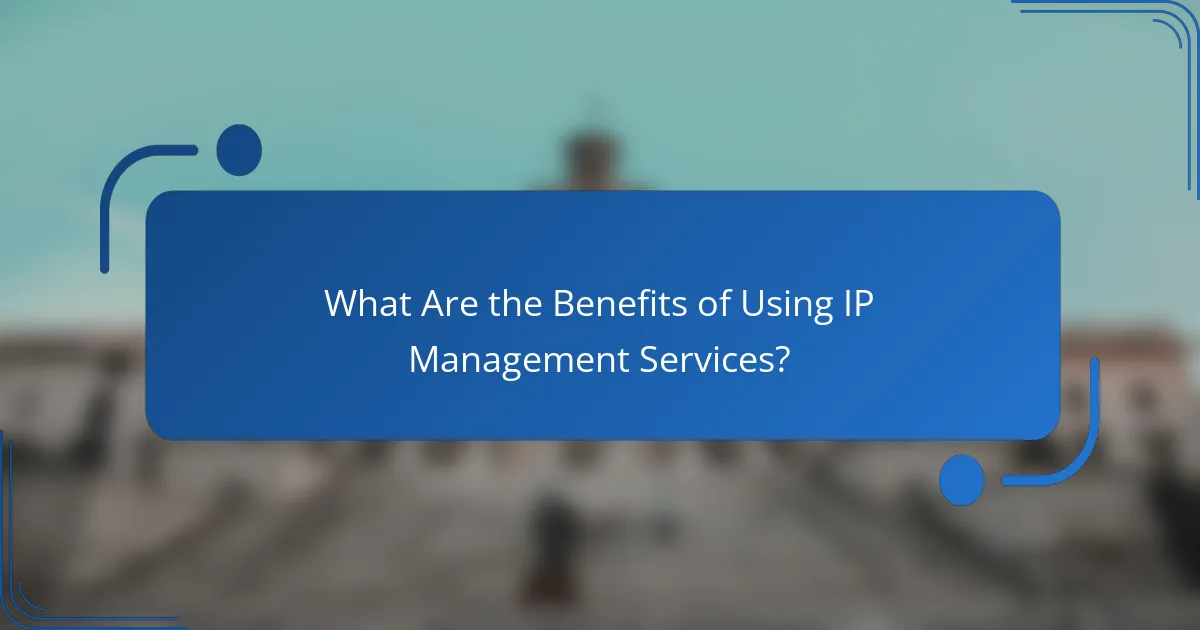
What Are the Benefits of Using IP Management Services?
IP management services streamline the administration of IP addresses, leading to improved operational efficiency and security. By automating processes and providing compliance support, these services help organizations optimize their network resources and protect sensitive data.
Improved network efficiency
Using IP management services enhances network efficiency by automating the allocation and management of IP addresses. This reduces the risk of conflicts and ensures that resources are utilized effectively, minimizing downtime and improving overall performance.
Organizations can expect faster network configuration and troubleshooting, as IP management tools often provide real-time visibility into network status. This allows for quicker responses to issues, which is crucial for maintaining service quality.
Enhanced security
IP management services bolster security by providing tools to monitor and control access to network resources. With features like IP address tracking and alerting for unauthorized access attempts, organizations can better protect their data and infrastructure.
Additionally, these services often include compliance checks against security standards, ensuring that the network adheres to best practices and regulatory requirements. This proactive approach helps mitigate risks associated with data breaches and unauthorized access.
Automated IP tracking
Automated IP tracking simplifies the process of monitoring IP address usage and availability. This feature allows organizations to maintain an accurate inventory of their IP addresses, reducing the likelihood of misallocation or exhaustion.
By leveraging automated tools, businesses can quickly identify unused or underutilized IP addresses, enabling more efficient resource allocation. This can lead to cost savings, particularly for organizations managing large networks.
Compliance support
IP management services provide essential compliance support by ensuring that organizations meet regulatory requirements related to data protection and network security. These services often include built-in compliance reporting features that simplify audits and assessments.
Staying compliant with regulations such as GDPR or HIPAA is crucial for avoiding penalties. IP management tools can help organizations track their IP address usage and document compliance efforts, making it easier to demonstrate adherence to legal standards.

What Are the Challenges in IP Management?
IP management faces several challenges that can hinder efficiency and effectiveness. Key issues include scalability, complexity of integration with existing systems, and ensuring data accuracy throughout the management process.
Scalability issues
Scalability is a major concern for organizations as they grow and their IP portfolios expand. Many software tools struggle to handle increased volumes of data and user demands, leading to slow performance or system crashes.
To address scalability, consider cloud-based solutions that can dynamically adjust resources based on usage. This flexibility can help maintain performance levels even as your IP assets increase.
Complexity of integration
Integrating IP management software with existing systems can be complex and time-consuming. Organizations often face challenges in aligning new tools with legacy systems, which can lead to data silos and inefficiencies.
To mitigate integration issues, choose software that offers robust APIs and supports common data formats. Conduct thorough testing during the integration phase to ensure seamless communication between systems.
Data accuracy
Maintaining data accuracy is crucial for effective IP management. Inaccurate data can lead to poor decision-making and potential legal issues, such as failed patent applications or trademark disputes.
Implement regular data audits and validation processes to ensure the integrity of your IP records. Utilizing automated data entry and management tools can also reduce human error and enhance overall accuracy.

What Criteria Should Be Used for Selecting IP Management Software?
When selecting IP management software, consider factors such as usability, integration capabilities, compliance with local regulations, and cost-effectiveness. These criteria help ensure that the software meets your organization’s specific needs while providing a reliable framework for managing intellectual property.
Usability and User Experience
Usability is crucial when evaluating IP management software. A user-friendly interface can significantly reduce the learning curve for your team, allowing for quicker adoption and more efficient workflows. Look for software that offers intuitive navigation, clear labeling, and accessible support resources.
Consider conducting trials or demos to assess the software’s usability firsthand. Gather feedback from potential users to identify any pain points or areas for improvement. Prioritize solutions that offer customizable dashboards and reporting features to enhance user experience.
Integration Capabilities
Integration capabilities are essential for ensuring that your IP management software can work seamlessly with existing systems. Check if the software can connect with other tools your organization uses, such as document management systems, CRM platforms, or accounting software. This integration can streamline processes and reduce data entry errors.
Evaluate the software’s API availability and compatibility with third-party applications. A flexible integration framework allows for smoother data transfer and enhances overall efficiency. Consider solutions that offer pre-built integrations with popular platforms to simplify implementation.
Compliance with Local Regulations
Compliance with local regulations is a critical factor in selecting IP management software, especially in jurisdictions with strict IP laws. Ensure that the software adheres to relevant standards and provides features that facilitate compliance, such as tracking deadlines and generating reports for regulatory submissions.
Familiarize yourself with the specific IP regulations in your region, such as the European Union’s General Data Protection Regulation (GDPR) or the United States Patent and Trademark Office (USPTO) guidelines. Choose software that offers tools to help manage compliance risks and maintain accurate records of IP assets.
Cost-Effectiveness
Cost-effectiveness is a key consideration when selecting IP management software. Assess the total cost of ownership, including licensing fees, implementation costs, and ongoing maintenance expenses. Compare different vendors to find a solution that offers the best value for your budget.
Look for software that provides tiered pricing options or subscription models, allowing you to scale your investment as your needs grow. Be cautious of hidden fees and ensure that you understand what features are included at each pricing level to avoid unexpected costs down the line.
